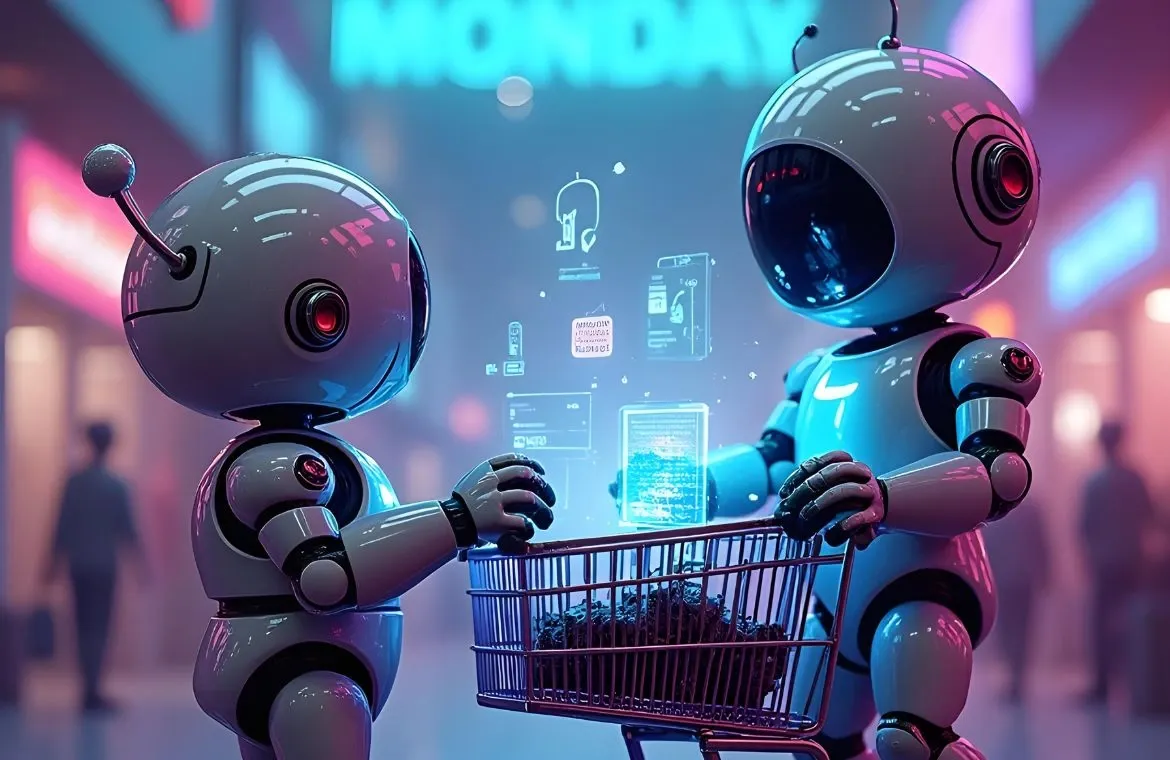AI Chatbots in E-commerce

AI chatbots are changing online retail and serving over 2 billion online shoppers. Shop owners know great customer service matters but might not understand how AI can help their business grow.
Your online shop can cut down cart abandonment rates with AI chatbots. These digital helpers give quick assistance, answer questions right away, and send well-timed discounts to customers who seem unsure about buying.
This blog, breaks down AI chatbots in simple terms and helps you learn how to use this technology in your e-commerce business effectively.
What are AI chatbots, and how do they work?
E-commerce businesses now use AI chatbots as virtual assistants that can simulate human conversation. These smart computer programmes talk to customers through text or voice and give instant responses without human help.
Understanding AI chatbots
AI chatbots are software applications that mirror human dialogue and enhance customer interactions in digital platforms. They process natural language from users, understand what they mean, and respond appropriately. Modern AI chatbots are different from simple automated systems because they use artificial intelligence to learn from every interaction and get better with time.
Also Read: AI Chatbots: The Smart Conversation Partners of the Future
How AI chatbots differ from traditional bots?
Traditional chatbots work with preset rules and limited scenarios. They follow strict decision trees with fixed responses. AI chatbots, on the other hand, use advanced technologies to understand context and give responses that sound natural.
Their capabilities show this fundamental difference:
| Feature | Traditional Chatbots | AI Chatbots |
| Technology | Rule-based, decision trees | NLP, machine learning, AI |
| Capabilities | Simple, predefined responses | Complex, context-aware responses |
| Learning | Static, no learning | Dynamic, improves over time |
| User Experience | Often frustrating for complex queries | More natural and satisfying |
| Flexibility | Limited to scripts | Highly adaptable |
Key technologies behind AI chatbots
AI chatbots depend on several core technologies that power their sophisticated features:
- Natural Language Processing (NLP): This backbone helps chatbots understand and interpret human language, including context, intent, and sentiment.
- Machine Learning: This technology lets chatbots learn from past interactions. They improve their response accuracy through supervised and unsupervised learning techniques.
- Natural Language Understanding (NLU): Chatbots can identify the meaning behind user inputs and handle issues like typos and translation challenges.
- Large Language Models (LLMs): These advanced neural networks train on massive datasets. They excel at understanding and generating natural language, which creates more human-like interactions.
The process combines these technologies seamlessly. A user sends a query, and the chatbot analyses it with NLP. It figures out the intent, keeps track of previous conversations, creates an appropriate response, and learns from each interaction to give better answers in the future.
The Evolution of AI in e-commerce
AI's experience in e-commerce dates back decades. It grew from simple automation tools into sophisticated conversational systems. These systems now handle millions of customer interactions daily.
From simple automation to conversational AI
Amazon made the first notable AI breakthrough in e-commerce back in 1998. The company launched collaborative filtering and recommendation features that made online shopping more engaging for customers.
Apple's Siri launched in 2011, followed by Google's Alexa in 2014. These assistants let people shop hands-free with voice commands.
The rise of generative AI in online retail
Generative AI marks the latest chapter in this development. Companies now use it across the e-commerce value chain.
Google's Gemini, Meta's Llama, and OpenAI's ChatGPT compete actively to make conversational commerce successful in online shopping. These advanced systems generate dynamic product descriptions, create customised marketing content, and deliver highly relevant recommendations that perform better than traditional methods.
How are AI chatbots used in e-commerce today?
Online stores now use AI chatbots at multiple customer touchpoints to create uninterrupted shopping experiences and cut operational costs. These intelligent assistants have become essential tools for e-commerce businesses that want to involve customers and drive sales.
Customer support and 24/7 assistance
AI chatbots have transformed how online stores handle customer service. 74% of shoppers now prefer chatbots over human interactions to resolve simple questions. These digital assistants welcome website visitors just like staff would in brick-and-mortar stores. Customers never feel ignored because they get instant help no matter their time zone.
Also Read: Beyond the Chatbot: How Smart AI Actually Makes Customer Service More Human
Product recommendations and personalisation
AI chatbots do more than just answer questions - they make shopping a personal experience. They work like digital personal shoppers by studying customer browsing patterns, past purchases, and current trends to suggest products that match perfectly.
For instance, A customer browsing winter boots receives suggestions for the best sellers in their size. The chatbot might recommend useful add-ons like waterproof sprays or share exclusive discounts.
Streamlining checkout and reducing cart abandonment
Cart abandonment rates hover around 70% in 2023, but AI chatbots help solve this issue. They reach out to potential buyers at key moments. A smart chatbot sends follow-up messages with discount offers or answers shipping questions to complete abandoned purchases.
Handling returns and post-sale queries
AI chatbots shine in returns management too. They help customers through the entire return process without human help. The bot shows nearby drop-off locations, explains what happens next, creates return labels, and starts refunds when returns get approved. It answers common questions like "Where's my return label?" or "How long until I get my refund?" and updates inventory systems right away.
Benefits of using AI chatbots
AI chatbots in your online shop will give you real benefits that affect your profits. These digital assistants are transforming e-commerce by enhancing shopping experiences and providing practical business insights.
1. Improved customer satisfaction
AI chatbots create better shopping experiences by offering 24/7 assistance whatever the time zone or business hours. Your customers get immediate help right when they need it.
2. Lower operational costs
We learned that AI chatbots save money. Companies save money because chatbots handle multiple customer questions at once without extra pay, shifts, or training costs.
3. Faster response times
AI chatbots solve problems quickly. Customers now get answers in under 2 minutes instead of waiting 11 minutes. Quick problem-solving is vital for keeping current customers and attracting new ones.
4. Better data collection and insights
AI chatbots excel at gathering data. They collect vital information about customer behaviour, priorities, and problems during chats. This knowledge helps spot trends, improve products, and enhance marketing plans.
AI chatbot trends shaping the future of e-commerce
AI chatbots in e-commerce are changing faster than ever, bringing new trends that alter how customers shop online.
Conversational commerce and voice shopping
Voice-activated shopping has become one of the biggest trends in e-commerce. People now use voice to search more tha half of the time, which makes businesses rethink their search strategies. Customers can create shopping lists, reorder items, and get custom recommendations just by speaking.
Hyper-personalisation through predictive AI
AI chatbots now go beyond simple personalization to deliver highly tailored experiences based on immediate data. These systems exploit data from multiple sources like browsing behaviour, social media activity, and location information. They can predict what customers need instead of just responding to requests. AI helps brands build complete 360-degree customer profiles that make each interaction feel custom-made to each person's priorities.
AI chatbots in social commerce
Social media has evolved into bustling marketplaces where AI chatbots facilitate product sales directly within apps like Instagram, TikTok, and WhatsApp. Smart assistants talk to customers through direct messages and comments. Users can shop without leaving their favourite social platforms. According to a report by Statista, the market size of social commerce is likely to reach over 80 billion U.S. dollars in 2030.
Balancing automation with a human touch
Technology keeps advancing, but the human element remains vital. The best approach combines AI's efficiency with human empathy, automated systems handle routine questions while people step in for complex issues or expensive purchases.
Conclusion
AI chatbots have without any doubt changed the e-commerce world. With round-the-clock availability and tailored interactions, your online store can see a measurable boost in customer satisfaction.
But this is only the beginning. The underlying technologies behind these chatbots, especially Generative AI, are evolving at breakneck speed, This technology keeps advancing at a remarkable pace
To truly harness this wave of innovation, businesses and professionals alike must upgrade their knowledge. That’s where generative AI courses come in. Note that human connection remains valuable despite these technological advances. The best strategy combines AI's efficiency with human empathy, automating routine tasks while maintaining human support for complex situations.
Because, Your e-commerce business needs a balanced approach which includes, chatbot solutions that match your specific needs and customer’s expectations.
Frequently Asked Questions
Q1. What are chatbots in e-commerce?
Chatbots in e-commerce are AI-powered tools that assist customers by answering queries, guiding purchases, offering support, and automating tasks to improve shopping experiences and boost sales efficiency.
Q2. How is AI used in e-commerce?
AI in eCommerce enhances customer experience through chatbots, personalised recommendations, inventory management, fraud detection, and dynamic pricing, boosting efficiency, sales, and customer satisfaction across platforms.
Q3. What is the future of AI in e-commerce?
The future of AI in e-commerce includes hyper-personalised shopping, predictive analytics, voice-based purchasing, more innovative chatbots, and seamless automation, enhancing customer experience while optimising operations and boosting sales.

TalentSprint
TalentSprint is a leading deep-tech education company. It partners with esteemed academic institutions and global corporations to offer advanced learning programs in deep-tech, management, and emerging technologies. Known for its high-impact programs co-created with think tanks and experts, TalentSprint blends academic expertise with practical industry experience.



